how to stop drug addiction on your own- Imagine it’s a Friday night and you’re scrolling feeds on social media.
Everyone is having fun and going to a concert, or party and you are sitting at home like a person who has lost his breath, thinking that maybe I can take a little chill pill and get rid of the tension, but this chill pill can become a problem.
The one that relieves stress easily. What seems like a way to reduce it becomes a daily habit. A support on which you start depending more and more.
You think to yourself that it doesn’t matter. This is just fun for a short while, but in the long run, you don’t understand the difference. Do you want to take this or do you want to and go to the streets of drug addiction?
Wait a little, drug addiction is not a mistake or a sign of weakness. Untimely, it is a disease of the brain. Listen, what is it that these drugs control the parts of the brain that make us feel good?
When you take these drugs, a dopamine party starts in the brain. A chemical that makes one feel very good. It seems as if your hard work and your success have paid off and you have achieved promotion.
You get so much happiness. The real problem is that the brain starts demanding this feeling again and again. So, you retake the drug, chasing that sweet dopamine rush. But here’s the twist: with repeated use, your brain needs more and more of the drug to produce the same happy effect.
It’s like a tolerance meter that keeps going up. This is when things get tricky. You might start using more of the drug, or using it more often, just to feel “normal”.
The Numbers Don’t Lie: The Shocking Impact of Drug Addiction
Let’s face it, drug addiction isn’t just something you see in gritty movies. It’s a real issue affecting millions of people around the world, including you or someone you know. Here’s a quick reality check with some eye-opening statistics:

- Millions Impacted: In the United States alone, according to the National Institute on Drug Abuse (NIDA), over 46 million people (aged 12 and older) battled a substance use disorder in the past year. That’s roughly one in ten Americans.
- Age Doesn’t Discriminate: While drug use might seem like a “young people” problem, addiction can strike at any age. Shockingly, NIDA reports that nearly 10 million young adults (aged 18-25) struggled with a substance use disorder in the past year.
- Deadly Consequences: Drug addiction is a major public health crisis. According to the Centers for Disease Control and Prevention (CDC), over 70,000 people in the US die from drug overdose annually. That’s more than the number of people killed in car accidents!
- Opioid Epidemic: A specific concern is the ongoing opioid crisis. These powerful prescription pain relievers and illegal drugs like fentanyl are highly addictive and contribute to a significant portion of overdose deaths.
- Beyond the Individual: Addiction’s impact goes far beyond the person struggling. It affects families, relationships, and communities. Imagine the strain on loved ones, the lost productivity at work, and the burden on healthcare systems.
These statistics are sobering, but there’s a silver lining. By raising awareness and understanding of addiction, we can break the stigma and encourage people to seek help.
Remember, you’re not alone in this, and there are resources available to overcome addiction and build a healthy, fulfilling life. (how to stop drug addiction on your own)
How to stop drug addiction on your own?
- Recognizing the Signs and Symptoms
- Understanding the Causes of Addiction
- The Dangers of Self-Detoxification
- Building Motivation for Change
- Creating a Personalized Recovery Plan
- Implementing Lifestyle Changes
- Seeking Professional Help
- Action Steps for Quitting an Addiction
- Exploring Addiction Treatment Options
- Finding Support for Addiction Recovery
- Learning Healthy Coping Mechanisms
- Being Aware of Drug Triggers
- Coping with Drug Cravings
- Building a Meaningful Drug-Free Life
- Overcoming Relapse and Bouncing Back
1. Recognizing the Signs and Symptoms
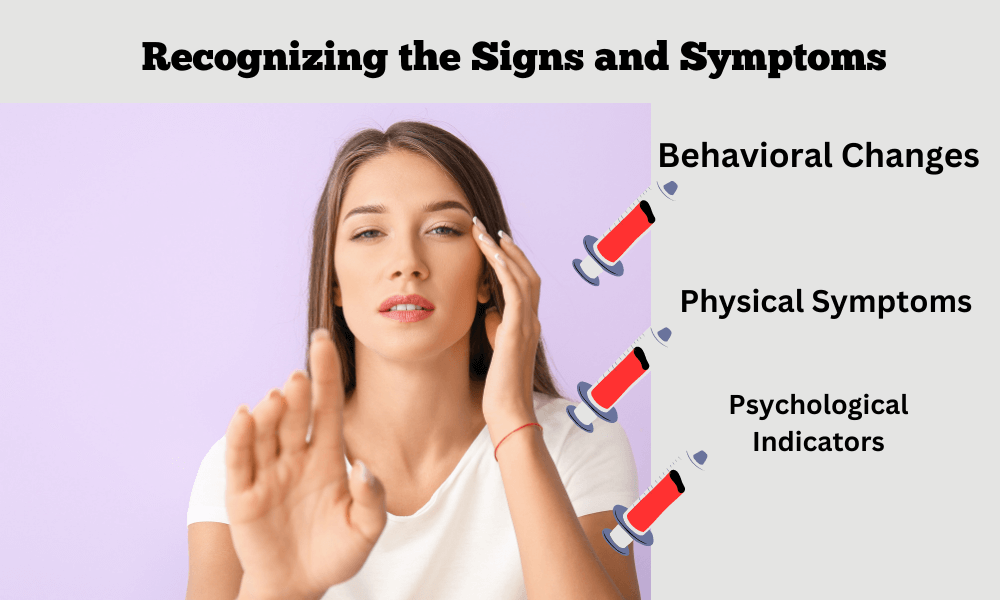
A. Behavioral Changes
Okay, now let’s talk about habits and behavior. The first sign of addiction is the habit of the person and it makes a difference. You become more quiet. If you see such changes in your friend, then understand that there is something wrong.
Earlier, he used to be ready for every adventure. Now he disappears at any time and cancels the plans at the last minute by making such excuses that it is unbelievable.
Due to addiction, people like to stay alone, they get away from their loved ones and the things that they used to enjoy earlier.
B. Physical Symptoms
Due to addiction, only the human mind is not able to move forward but deteriorates. His health is also adversely affected. It is very important to understand these signs so that the problem can be caught early and good treatment can be provided.
- Unexplained Weight Loss or Gain:
Changing weight can also be a signal of a problem with addiction. Some drugs reduce the appetite due to which the weight gets reduced and some drugs increase the appetite. These or other unhealthy things are graded, which increases the weight.
If there are fluctuations in your weight that you cannot explain with food and exercise, then it could be a drug problem.
- Changes in Sleep Patterns:
Excessive use of drugs can disrupt sleep patterns, leading to sleeplessness, waking up in the middle of the night, or excessive drowsiness.
Stimulants such as cocaine or methamphetamine can cause sleeplessness and hyperactivity, while alcohol or opioids can Diseases like AIDS make a person sleepy and do not allow him to sleep properly. New sleep patterns can spoil your health, brain activity, and mood.
- Health Issues Related to Substance Abuse:
Chronic substance abuse can seriously mess with your health, both in the short term (acute) and the long term (chronic). Here’s a rundown of some of the problems it can cause:
Heart trouble: High blood pressure, heart disease, and irregular heartbeat.
Breathing problems: Chronic bronchitis, pneumonia, and even lung cancer.
Liver damage: Hepatitis, cirrhosis (scarring), and even liver cancer.
Gut issues: Stomach ulcers, gastritis (inflammation), and pancreatitis (inflamed pancreas).
Brain problems: Seizures, strokes, and trouble thinking clearly.
Weak immune system: You’ll get sick more easily.
- Skin Changes:
Drugs and alcohol can really mess with your skin, not just your insides. Here’s what you might see:
Dry, itchy skin: Feels like you constantly need lotion.
Breakouts and rashes: Like acne or other skin problems.
Scars and sores: From injecting drugs.
Early wrinkles: Especially if you drink or smoke a lot.
Taking care of yourself includes taking care of your skin. So if you’re looking to get better, this is another reason to quit.
- Dental Problems:
Certain substances, particularly stimulants like methamphetamine or cocaine, can have detrimental effects on oral health. These may include tooth decay, gum disease, tooth loss, oral infections, and dental erosion due to bruxism (teeth grinding) or acidic substances.
Recognizing these physical signs and symptoms of addiction is crucial for early intervention and effective treatment. Individuals experiencing these symptoms should seek professional help from healthcare providers, addiction specialists, or mental health professionals to address underlying issues and embark on the path to recovery. (how to stop drug addiction on your own)
C. Psychological Indicators
Addiction is often accompanied by underlying psychological issues that contribute to its development and exacerbate its effects. These psychological signs tell us how a person builds a relationship with the drug and when can he come back from the drug. Let’s look at some common psychological targets.
- Anxiety Disorders:
A person faces a lot of trouble due to anxiety disorder. They feel scared and get nervous again and again. Such people start using drugs or alcohol to reduce this tension. But by taking drugs, this problem increases even more and the person is unable to live without taking drugs.
- Depression:
Depression is also a common psychological problem, which is associated with drug addiction. In such a situation the person feels sad, does not see any hope, and remains worried. To forget his emotional pain, he takes drugs or drinks alcohol. But drug addiction increases depression and the disease becomes even more difficult.
- Mood Disorders:
Mood disorders such as bipolar disorder or cyclothymia are characterized by extreme fluctuations in mood, energy levels, and behavior. Such people use drugs to feel better in depression or to remain more energetic during panic episodes. But taking drugs due to this, the mood cannot be detected properly and the mood swings increase further.
- Trauma and PTSD:
If something very bad has happened to the man, like physical or sexual abuse, an accident or he has been in a rage, then the danger increases. Such people use drugs so that they can forget bad memories. To reduce problems or to emphasize your feelings. However, taking drugs increases this problem and can cause difficulty in recovery.
- Co-occurring Disorders:
Sometimes addiction goes hand-in-hand with mental health problems like anxiety or depression. This can make getting better even harder. The good news is that there are treatment programs that address both issues at the same time. This way, you can tackle your addiction and any mental health struggles you might have for a more complete recovery.
It is very important to understand the psychological aspect of addiction so that the cause of addiction can be known and good treatment can be provided. If this psychological problem is cured then people can quit addiction and feel good mentally and emotionally again.
For this, treatment is required which includes therapy, medicines, and support services all together so that both the addiction and the mental health disorder are cured. (how to stop drug addiction on your own)
You may also like to read on “Why are Drugs so Hard to Quit?“
2. Understanding the Causes of Addiction
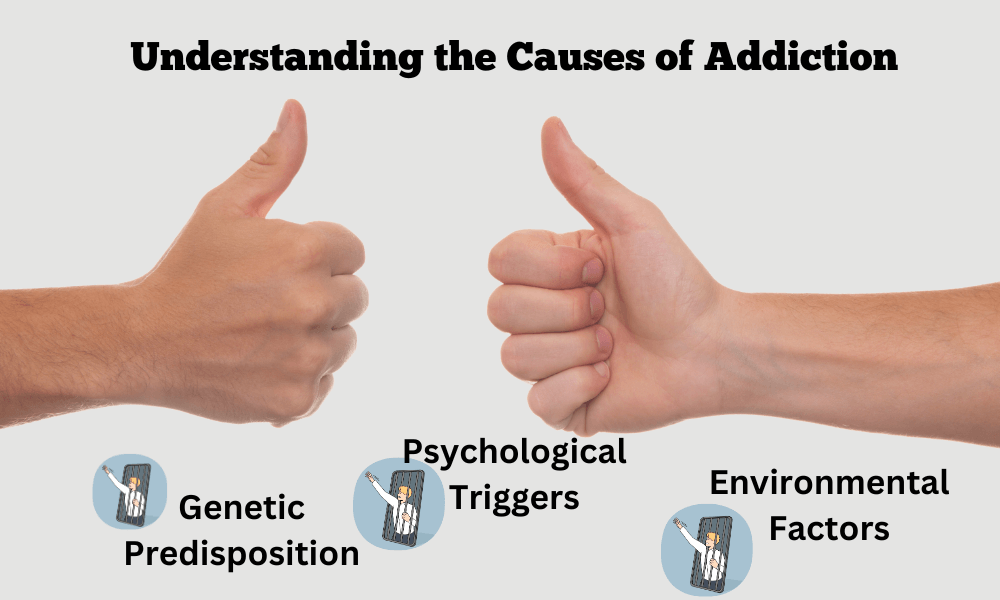
A. Genetic Predisposition
Our genes also play a role, sometimes this comes from our family. For example, if someone in your house has a problem with drug addiction, then you too may have this problem, but this is not guaranteed at all.
B. Environmental Factors
Addiction is a complex issue with a variety of contributing factors, ranging from biological and genetic predispositions to environmental influences. Early life experiences like a difficult upbringing or exposure to trauma can increase the risk of addiction, while social circles where substance use is prevalent can create peer pressure.
Additionally, mental health conditions often co-occur with addiction, making it crucial to address both issues for a successful recovery. Fortunately, there are many effective treatment options available, including individual therapy, support groups, and medication-assisted treatment, all of which can empower individuals to overcome addiction and build a healthy, fulfilling life.
C. Psychological Triggers
Recognizing and addressing psychological triggers, those emotional hooks like stress, past traumas, or unresolved issues, is a crucial step in addiction recovery. By developing healthy coping mechanisms to deal with these triggers, individuals can significantly increase their chances of long-term success and prevent relapse. (how to stop drug addiction on your own)
3. The Dangers of Self-Detoxification
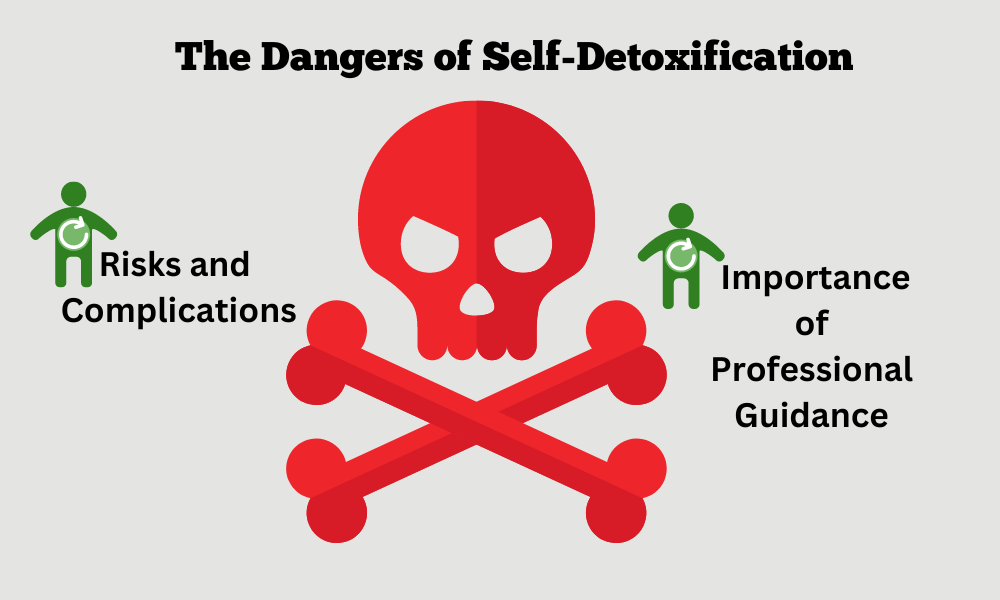
A. Risks and Complications
Thinking you can detox on your own might seem like a good idea if you’re unsure about getting professional help. But it’s not that easy. When you stop using drugs or alcohol, it can make you feel really bad. How bad it gets depends on what you’ve been using, how long, and your health.
Withdrawal symptoms can be mild or really serious. If you’re trying to quit alcohol or certain drugs like benzos, you might shake, have seizures, see things that aren’t there, or get really confused. This can be dangerous. Without the right help, things can get worse fast.
With drugs like heroin or painkillers, you might feel like you have the flu, have strong cravings, stomach problems, or feel anxious. In serious cases, it could lead to problems like dehydration, messed-up minerals in your body, or trouble breathing.
Trying to detox on your own also makes it more likely you’ll go back to using drugs or alcohol. The cravings and feeling bad can be so strong that you give in and use again. This can make it hard to stop for good and can even be dangerous.
And trying to detox on your own doesn’t deal with why you started using drugs or alcohol, like feeling sad or being around people who use them. If you don’t deal with those things, it’s hard to stay sober for long.
But if you get help from doctors and nurses, it’s safer and more likely to work. They can watch over you all the time, give you medicine to make you feel better, and make sure you’re as comfortable as possible. They can also help you get ready for what comes after detox, like counseling or support groups.
In short, trying to detox on your own might sound like a good idea, but it’s risky. Getting help from medical pros is safer and gives you a better chance of kicking your addiction for good.
In summary, while the prospect of self-detoxification may seem appealing, the risks and complications far outweigh any perceived benefits.
Supervised detoxification under the guidance of medical professionals offers a safer, more effective, and more compassionate approach to withdrawal management, setting the stage for successful recovery from addiction. (how to stop drug addiction on your own)
B. Importance of Professional Guidance
Seeking professional guidance during the detoxification process is paramount for ensuring a safe and successful transition to sobriety. While the temptation to undertake detoxification alone may arise, the expertise and support of medical professionals can significantly enhance the likelihood of a positive outcome.
Professional guidance offers several critical advantages:
- Tailored Treatment Plans:
Doctors are experts who can create a personalized plan to get you off drugs safely. They consider everything about you and your situation, like
What kind of drug you’re addicted to and how severe it is
Your overall health
Any other mental health problems you might have
If you’ve tried getting off drugs before
By thinking about all of this, they can make the detox process as easy and safe as possible for you.
- Monitoring and Assessment:
The doctor will follow up with you regularly to see how the medicines are working. They will also check whether things like blood pressure, and sugar level are correct or not. If there is any problem then they can change the medicine or treatment.
- Intervention and Support:
Doctors can handle anything that comes up during detox. They can help you manage withdrawal symptoms, even if they’re bad, take care of any health problems that pop up, and give you emotional support during this tough time. By having a doctor oversee your detox, you’re less likely to relapse and have a smoother journey towards getting sober.
- Reduced Risk of Relapse:
Detoxing with a doctor is the safest and most effective way to quit because it addresses both your body and mind. They can help you manage withdrawal symptoms, which can make you crave substances less, give you medicine to ease cravings and make the process easier, and talk to you about your addiction and how to deal with it mentally.
This support system makes it less likely you’ll relapse and gives you a stronger foundation for staying sober in the long run.
- Transition to Further Treatment:
Your doctor will also suggest what treatment you should take next. This can include things like staying at a place like a rehab center, getting treatment, or joining a support group. With this, your treatment continues and you can completely quit the drug addiction.
It becomes easy to quit drug addiction by taking the help of a doctor, the doctor supports you and boosts your courage. This keeps your future healthy and happy.
In summary, professional guidance during detoxification is essential for ensuring a safe, effective, and supportive experience. Medical professionals offer tailored treatment plans, ongoing monitoring and assessment, timely intervention and support, reduced risk of relapse, and seamless transition to further treatment.
By entrusting detoxification to the expertise of professionals, individuals can embark on the path to sobriety with confidence and optimism for a brighter, healthier future. (how to stop drug addiction on your own)
4. Building Motivation for Change
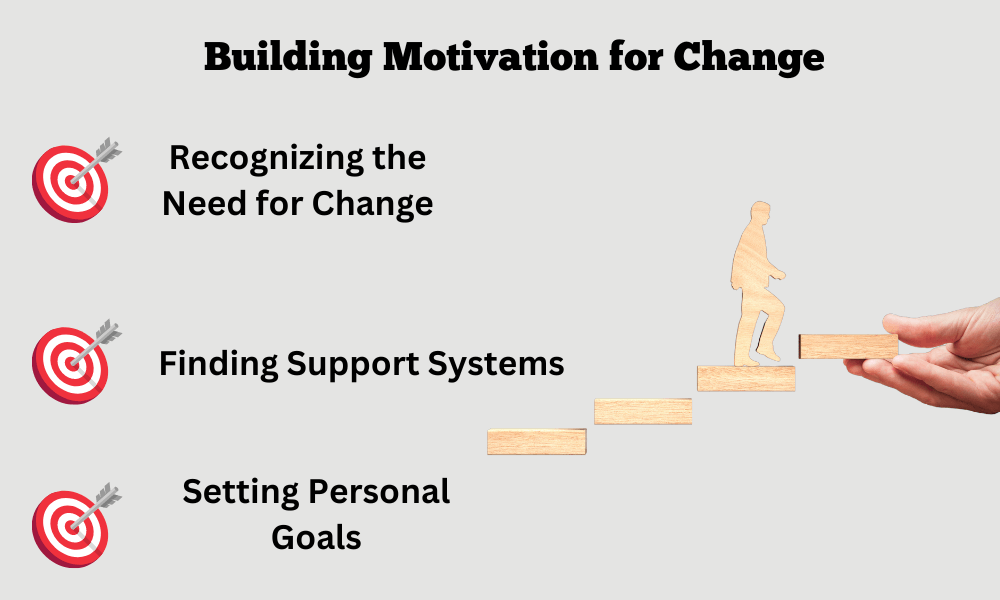
A. Recognizing the Need for Change
The first step in overcoming addiction is acknowledging the need for change. Whether prompted by personal realization, external pressure, or a desire for a better future, recognizing the detrimental effects of addiction is essential for initiating the journey to recovery.
B. Setting Personal Goals
Setting achievable and meaningful goals is instrumental in maintaining motivation throughout the recovery process. Whether it’s reconnecting with loved ones, pursuing career aspirations, or improving overall health and well-being, establishing clear objectives can provide direction and purpose.
C. Finding Support Systems
Recovery is not a journey to be undertaken alone. Building a support network of family, friends, peers, and professional counselors can provide invaluable encouragement, accountability, and guidance.
Surrounding oneself with positive influences and sources of support can strengthen resilience and facilitate lasting change. (how to stop drug addiction on your own)
5. Creating a Personalized Recovery Plan
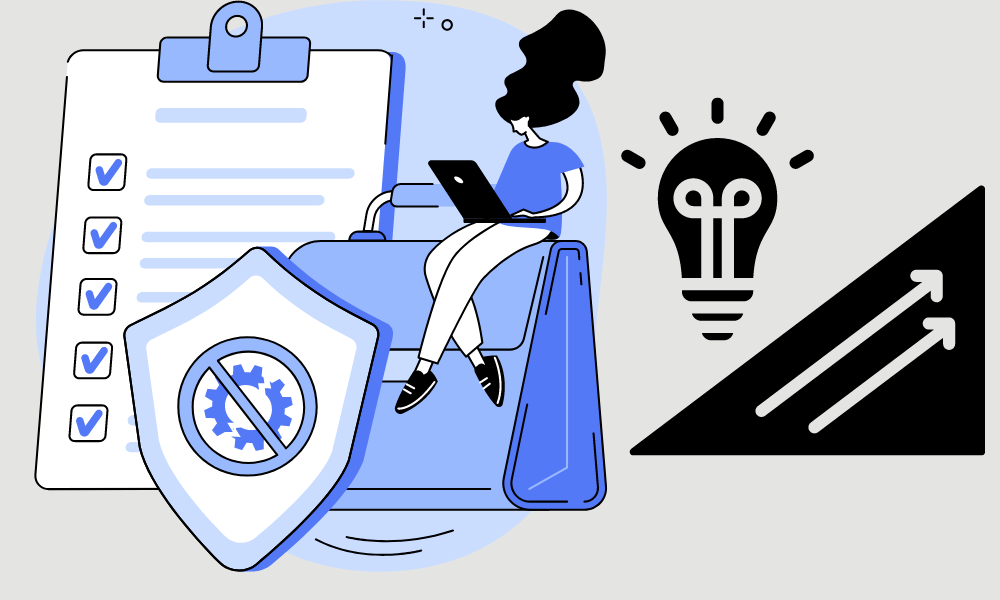
A. Setting Realistic Expectations
Quitting an addiction is a journey that takes some time. It requires a lot of patience, commitment, and courage. If you expect very fast progress in the beginning, you may face problems. Therefore, little by little work and learning experiences should be accepted, so that you remain motivated and successful in quitting addiction.
B. Identifying Triggers and Cravings
It is important that you know what things lead you to take drugs and when you feel like taking drugs. This could be a specific place or emotions. By understanding the intentions and thinking of ways to avoid them, you will not take drugs even in difficult situations.
C. Developing Coping Strategies
Once you know what triggers you, you can think of ways to reduce your urge to take drugs and prevent you from going back to drugs. These strategies may include mindfulness techniques, stress-reduction exercises, and healthy distractions to redirect attention and alleviate discomfort.
6. Implementing Lifestyle Changes
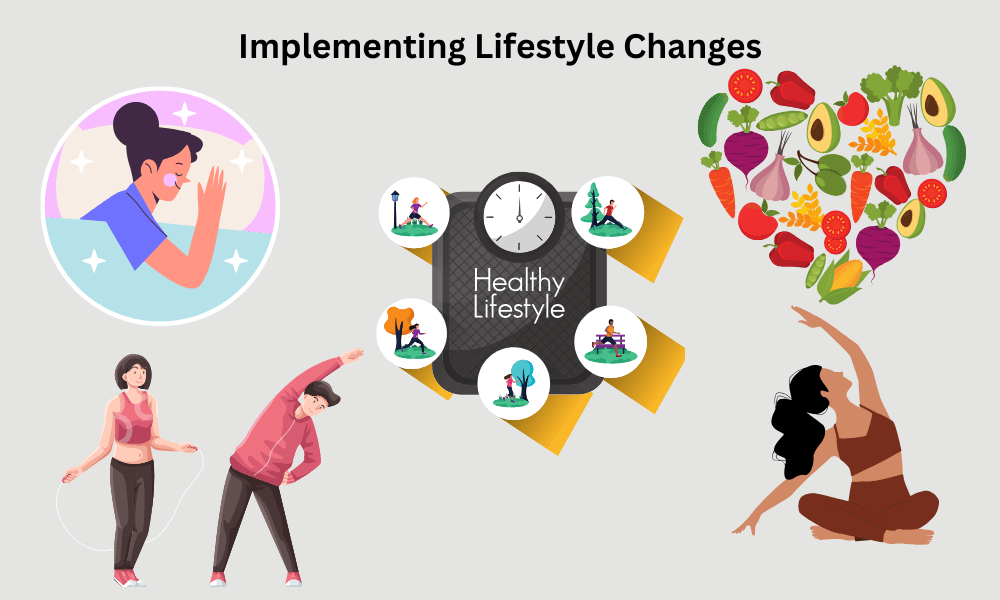
A. Establishing Healthy Habits
Building healthy habits is a super important part of getting better from addiction. These habits take care of your whole body and mind, making you stronger and less likely to relapse. Here are some key things to focus on:
- Exercise: Get your body moving! Find activities you enjoy, like walking, running, yoga, or anything that gets you going. Exercise helps you feel good, reduces stress, and gives you energy.
- Healthy eating: Eat plenty of fruits, vegetables, lean protein, and whole grains. This gives your body the nutrients it needs to heal and stay strong. Pay attention to your hunger cues and avoid unhealthy processed foods.
- Good sleep: Aim for 7-8 hours of sleep each night. Having a regular sleep schedule and relaxing before bed will help you sleep better. Feeling well-rested is essential for managing stress and cravings.
By taking care of yourself physically and mentally, you’re setting yourself up for success in recovery. These healthy habits will not only help you stay sober but also improve your overall quality of life. (how to stop drug addiction on your own)
B. Nutrition and Exercise
Nutrition and exercise are two strong pillars of recovery that serve as the foundation of physical and mental health. By prioritizing these aspects of self-care, a person can improve their health, mental toughness, and quality of life during their recovery.
Nutrition
A balanced and nutritious diet is essential to support the body’s healing and recovery process. A healthy diet provides essential nutrients, vitamins, and minerals. Provides physical nutrition, boosts immunity, and Promotes overall health.
Including a variety of whole foods such as fruits, vegetables, lean proteins, whole grains, and healthy veggies ensures individuals get the nutrients they need to support body health.
In addition to providing essential nutrients, a nutritious diet can also help stabilize blood sugar levels, regulate mood, and reduce cravings for addictive substances. Foods rich in complex carbohydrates, such as whole grains and legumes, provide sustained energy levels and promote stable mood and cognitive function.
Including sources of omega-3 fatty acids, such as fatty fish, nuts, and seeds, can support brain health and reduce inflammation, which may be heightened during the recovery process.
Drinking an adequate amount of water throughout the day helps maintain proper hydration, supports detoxification processes, and promotes optimal bodily functions. Limiting or avoiding sugary beverages and excessive caffeine intake can help prevent dehydration and support overall health.
Exercise
Moving your body is awesome for recovery. Exercise helps in a few ways:
- Boosts your mood: It releases endorphins, those feel-good chemicals in your brain that make you happy and less stressed. This can be a big help when you’re dealing with cravings.
- Makes you stronger and healthier: Exercise keeps your heart healthy, your muscles strong, and your weight in check. It can even help you sleep better.
- Gives you a sense of accomplishment: Sticking to an exercise routine is something to be proud of! It shows you’re committed to getting better.
Find activities you enjoy, like walking, biking, swimming, dancing, or even yoga. The key is to get moving and have some fun. By taking care of your body with exercise and healthy eating, you’ll be well on your way to a healthy recovery.
C. Stress Management Techniques
Stress management methods are very important for recovery. By learning these methods, you can fight the problems of life without any addiction. By adopting these you can increase your mental strength. Can reduce anxiety and deal with stress in a better way, in which you can achieve your goal of not getting addicted.
- Deep Breathing
Breathing exercises are a simple but very powerful and effective way to reduce stress and relax. Focusing on slow and deep breathing triggers the body’s automatic calming response, which calms the mind. And the nervous system works properly.
Deep breathing methods such as diaphragmatic breathing or belly breathing is an effective process that you can do anywhere, anytime, and can easily relieve stress and anxiety.
- Meditation
Meditation calms the mind, increases consciousness, and makes one feel emotionally good. With regular practice, you can learn to observe your thoughts and feelings without judgment, creating a sense of peace and clarity in the mind.
Mindfulness meditation, guided imagery, or loving-kindness meditation are just a few of the many meditation techniques that individuals can explore to manage stress and promote mental resilience. This is a healthy way of living life.
- Yoga
Yoga combines physical postures, breathwork, and meditation to promote holistic well-being and stress relief. By doing yoga daily, your flexibility increases, your strength increases, your balance increases, and your mind feels at peace. Your stress reduces, and your focus level increases.
Emotional connectivity improves when you pay attention to your breathing. The breath is the bridge of your mind and body. You can keep your mind and body in balance. You can be worried free. You can be self-aware.
Peace and awareness are created in you. This is a great way to get rid of anything, be it addiction depression anxiety stress, or anything.
- Progressive Muscle Relaxation
Progressive muscle relaxation is a cool trick to help you relax. Here’s how it works: you tense different parts of your body, one at a time, for a few seconds and then, you completely relax those muscles.
By doing this all over your body, you can release tension and feel calmer. The more you practice, the better you’ll get at noticing when you’re tense and how to relax those muscles. This can be a great way to manage stress, which can be a trigger for using substances again.
Incorporating these stress management techniques into daily routines empowers individuals to navigate life’s challenges with resilience, grace, and clarity.
By cultivating a toolbox of effective coping strategies, individuals in recovery can proactively manage stress, reduce the risk of relapse, and foster a deeper sense of well-being and fulfillment in sobriety. (how to stop drug addiction on your own)
7. Seeking Professional Help
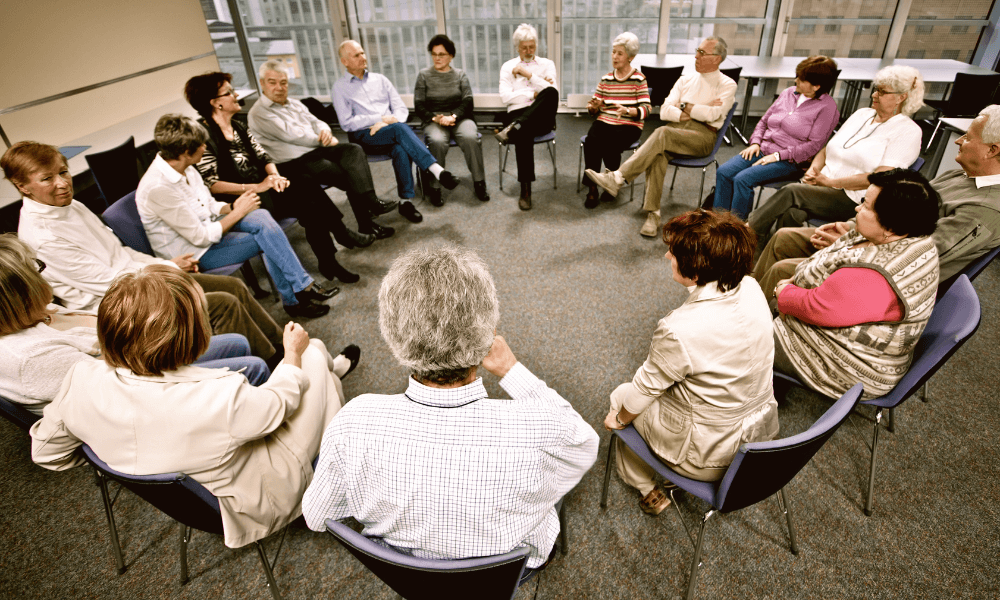
A. Therapy Options
Many types of help can be found on the way to recovery, using which you can move forward strongly.
Let’s explore them in detail: Therapy provides a safe and supportive environment where individuals can get to the root of their problems, learn how to cope and change negative thinking and habits.
There are different types of therapy, such as Cognitive Behavioral Therapy (CBT), Dialectical Behavioral Therapy (DBT), and Motivational Interviewing, which can be used according to the needs and preferences of the individual.
There are many types of help available on the path to recovery, which you can use to move forward stronger. Therapy is a safe and supportive one.
B. Medication-Assisted Treatment
Medication-assisted treatment, or MAT for short, is like a toolbox for getting better from drug or alcohol addiction. It combines medicines with therapy sessions to help you in two ways:
- Medicine: Doctors can give you special medications, like methadone, buprenorphine, or naltrexone, to ease withdrawal symptoms and cravings. This makes quitting feel less difficult.
- Therapy: You’ll also talk to a therapist who can help you understand your addiction and develop healthy coping mechanisms to stay drug-free for the long haul.
So, MAT helps you manage your physical urges while also giving you the tools to stay strong mentally. It’s a comprehensive approach to getting healthy and staying healthy.
C. Support Groups and Peer Counseling
Joining a support group can be a big help when you’re trying to overcome addiction. These groups, like Alcoholics Anonymous (AA) and Narcotics Anonymous (NA), connect you with other people who have struggled with similar issues.
This can help you feel like you’re not alone and that others understand what you’re going through.
People in support groups can also offer encouragement and advice. They can share their own stories of recovery and give you tips on how to stay on track. You can also learn from their mistakes and successes.
Support groups can be a great place to make friends who will support you in your recovery journey. They can also help you stay accountable for your goals. (how to stop drug addiction on your own)
8. Action Steps for Quitting an Addiction
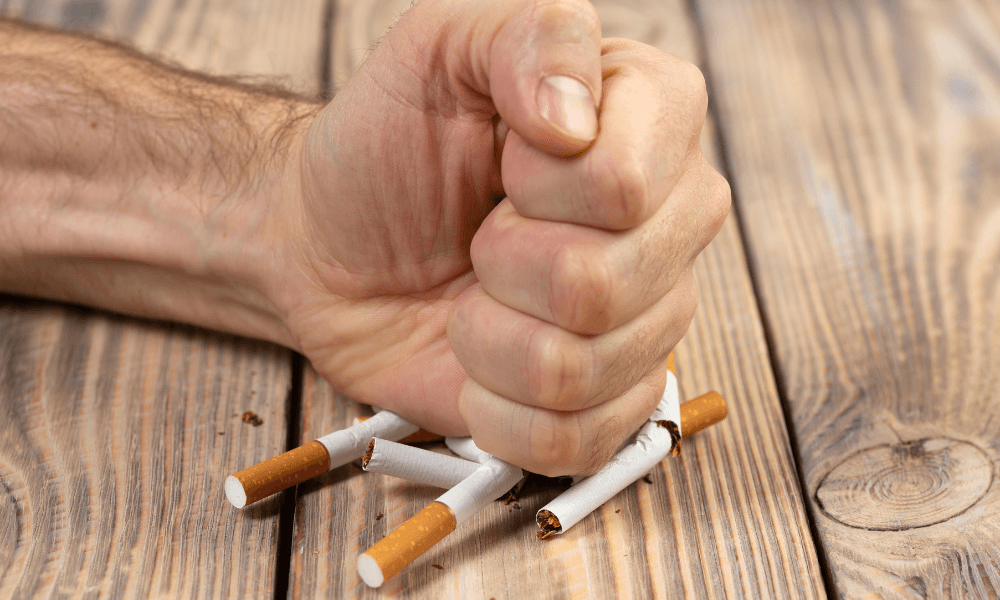
A. Acknowledge the Problem
The first step to feeling better is admitting you struggle with addiction. It might be scary, but pretending it’s not real won’t make it disappear. Owning up to what’s happening is the most important step to getting help and starting to feel good again.
B. Set Clear Goals for Recovery
Having clear goals is like having a roadmap for getting better. These goals can be anything you want to achieve, like staying sober for a certain amount of time, fixing things with loved ones, or trying something new you’ve always wanted to do.
Having clear goals in mind will help you stay motivated and see how far you’ve come on your recovery journey. (how to stop drug addiction on your own)
C. Seek Professional Guidance
Getting help from a professional is like having a coach on your recovery team. They’ve seen it all and can help you figure things out. This could mean talking to a therapist one-on-one, joining a support group, or even getting some medication to help with cravings.
No matter what kind of help you choose, a professional can give you the tools and support you need to stay on track.
You can read our article on “Empowering Recovery: Effective Solutions to Stop Drug Abuse“
9. Exploring Addiction Treatment Options
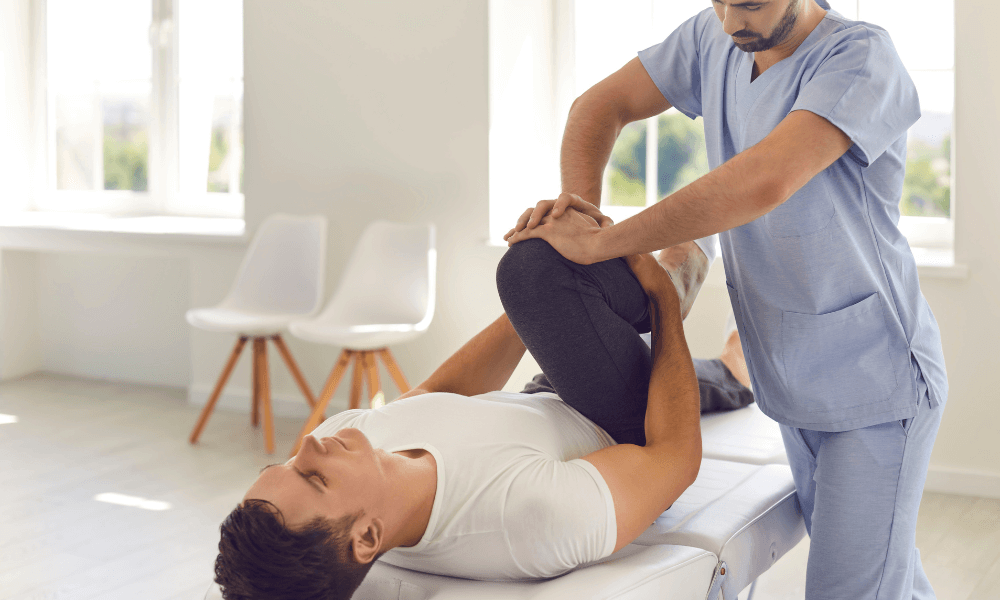
A. Inpatient Rehabilitation
Inpatient rehab programs are like going to a special recovery center where you can focus entirely on getting better. These programs help you in a few ways:
- They get you off substances safely: Doctors can help manage any discomfort you might feel while stopping your addiction.
- They provide therapy: You’ll talk to professionals one-on-one and in groups to learn how to stay sober.
- They teach you life skills: You’ll learn healthy ways to cope with stress and challenges.
- They plan for your future: The program will help you create a plan to stay sober after you leave.
B. Outpatient Programs
Outpatient rehab is like getting help for your addiction without having to stay in a treatment center. It’s a good option if your addiction isn’t too severe and you still need to take care of your daily life. Outpatient programs typically offer:
- Talking to therapists: They’ll help you understand your addiction and develop healthy coping mechanisms.
- Medications (if needed): Doctors can prescribe medication to help manage cravings and withdrawal symptoms.
- Support groups: You can connect with others who are going through similar struggles.
C. Holistic Therapies
Regular addiction treatment is great, but there are other ways to heal too, like:
- Acupuncture and yoga: These can help you relax and feel better in your body.
- Art therapy: This lets you creatively express yourself.
- Spending time with horses: This can be calming and help you connect with yourself.
These are all ways to take care of your mind, body, and spirit on your recovery journey.
(how to stop drug addiction on your own)
10. Finding Support for Addiction Recovery
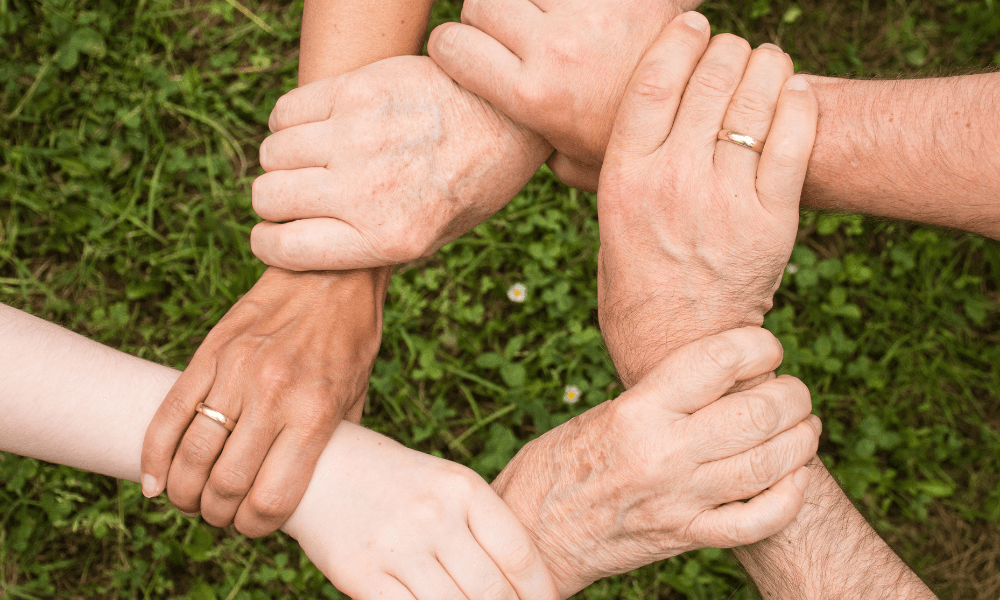
A. Family and Friends
Your family and friends are there for you during recovery. Here’s how they can help:
- Be encouraging and understanding: Let them know you’re trying to get better and that their support means a lot.
- Help out with practical things: Maybe they can run errands or help you cook healthy meals.
- Communicate openly and honestly: Talk about how you’re feeling and what kind of support you need.
- Set healthy boundaries: It’s okay to say no to things that might tempt you to use again.
By working together, you and your loved ones can build strong relationships that will support your recovery journey.
B. Support Groups
Feeling like you’re not alone is a big part of getting better. Support groups are like having a team of people who understand what you’re going through. You can meet them in person or online, and you can: Share your experiences and hear from others, Encourage and support each other, and Feel like you belong to a community.
This can be a huge help on your road to recovery. (how to stop drug addiction on your own)
C. Online Communities
Online communities and resources, such as forums, chat rooms, and social media groups, provide accessible support and information for individuals in recovery. These platforms offer anonymity, convenience, and a wealth of shared experiences and perspectives from people around the world. (how to stop drug addiction on your own)
11. Learning Healthy Coping Mechanisms
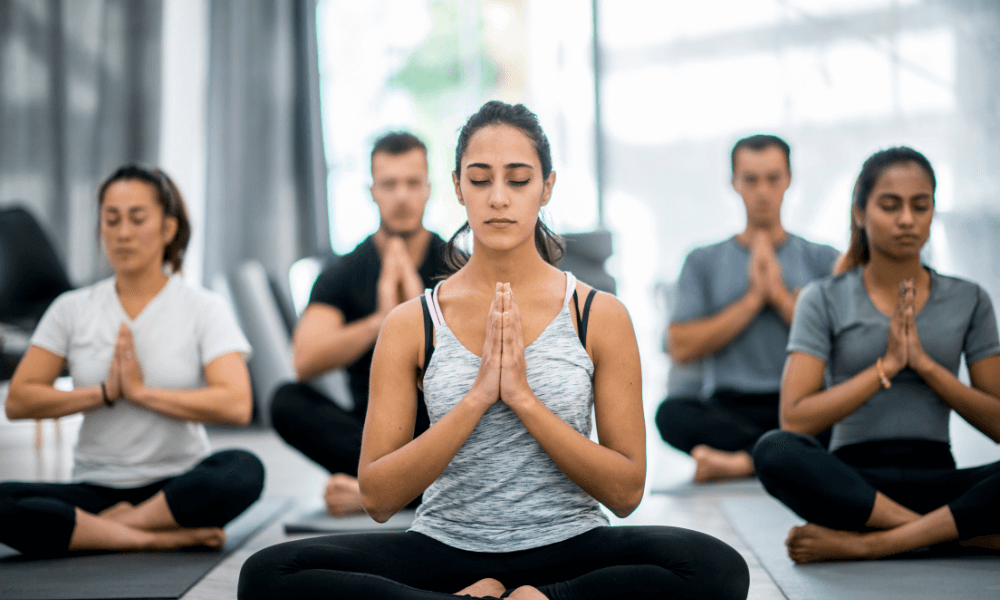
A. Stress Management Techniques
Getting better from addiction is tough, and stress can make it even harder. That’s why learning ways to manage stress is super important. There are some cool tricks you can try, like:
- Deep breathing: Take slow, deep breaths to calm your mind and body.
- Muscle relaxation: Tense and relax different muscle groups to release built-up tension.
- Mindfulness meditation: Focus on the present moment to find inner peace.
These techniques can help you feel more relaxed and in control, making your recovery journey easier.
B. Mindfulness and Meditation
Mindfulness and meditation are like taking a step back and looking at your thoughts and feelings without getting caught up in them. This can help you in a few ways:
- Become more aware of yourself: You’ll understand what stresses you out or makes you crave substances.
- Learn to accept your feelings: It’s okay to feel stressed or tempted, but you don’t have to act on it.
- Make better choices: With more self-awareness, you can choose healthy ways to cope with challenges.
By practicing mindfulness and meditation, you’ll be better equipped to handle cravings and stay on track with your recovery. (how to stop drug addiction on your own)
C. Engaging in Creative Outlets
Doing creative things you enjoy, like painting, playing music, writing, or even gardening, is awesome for recovery. Here’s why:
- Express yourself: Get your feelings out in a healthy way.
- Relax and unwind: Creative activities can take your mind off stress.
- Feel good about yourself: Creating something cool can boost your confidence.
- Find joy in life: Doing things you enjoy can make recovery more fun!
So go ahead, unleash your inner artist, and explore your creative side.
12. Being Aware of Drug Triggers
A. Identifying Triggers
To stay sober, it’s important to know what makes you want to use it again. These things are called triggers. Triggers can be things outside you, like certain people or places, or things inside you, like feelings or stress. Once you know your triggers, you can figure out healthy ways to deal with them so you don’t relapse.
B. Avoiding High-Risk Situations
Once identified, individuals can take proactive steps to avoid or minimize exposure to high-risk situations and triggers. This may involve changing routines, setting boundaries, or seeking alternative activities and environments that support sobriety and well-being.
C. Developing Strategies to Cope
In addition to avoidance, individuals can develop coping strategies to manage triggers when they inevitably arise. These strategies may include relaxation techniques, assertive communication, problem-solving skills, and seeking support from peers, mentors, or professionals. (how to stop drug addiction on your own)
You can read on “Diagnosis“.
13. Coping with Drug Cravings
A. Distraction Techniques
Cravings can be tough, but there are ways to deal with them in the moment. Here’s what you can do:
- Distract yourself: Do something fun and engaging to take your mind off the craving. This could be exercise, a hobby, hanging out with friends, or anything that works for you!
- Focus on something else: Play a game, read a book, listen to music – anything to shift your attention away from the craving.
The key is to find healthy ways to distract yourself until the craving passes. This will help you stay strong and resist temptation.
B. Delaying Gratification
Sometimes you might get a super strong urge to use it again. Resisting that urge is like delaying gratification. It means waiting a bit before you do anything and thinking about the bigger picture. By waiting, you can:
- Avoid making a decision you’ll regret later.
- Give yourself time to calm down and make a healthier choice.
- Remember why you’re getting better in the first place.
It’s not always easy to wait, but it’s a super important skill to learn in recovery.
C. Seeking Support from Others
Seeking support from trusted individuals, whether friends, family members, or support group members, can provide encouragement, accountability, and practical assistance during times of craving or temptation. Connecting with others who understand and empathize with the challenges of recovery can bolster resilience and strengthen resolve.
Knowing you’re not alone can be a huge motivator in recovery. So reach out to your support system – they’re there for you. (how to stop drug addiction on your own)
14. Building a Meaningful Drug-Free Life

A. Setting Meaningful Goals
Having goals is like having a roadmap to a happy, drug-free life! These goals can be anything you want to achieve, big or small. Here are some ideas:
- Go back to school or learn a new skill.
- Get that job you’ve always wanted.
- Fix things with your loved ones.
- Help others going through similar struggles.
Setting goals that matter to you will keep you motivated and excited about your recovery journey.
B. Engaging in Positive Activities
Doing things you enjoy is a powerful tool in recovery. It can help you in a few ways:
- Stay busy and have fun: Find hobbies you love, like volunteering, sports, or anything that excites you. This will keep you away from temptation.
- Feel good about yourself: Achieving goals and helping others can boost your confidence.
- Connect with others: Being social and having a support system is important for recovery.
The more you fill your life with positive activities, the less likely you are to relapse. So go out there and have some fun.
C. Cultivating Healthy Relationships
Who you spend time with matters in recovery. Surrounding yourself with positive people is like building a strong support system. These people will:
- Believe in you: They’ll encourage you and remind you why you’re getting better.
- Make you feel good: Supportive people will boost your self-esteem and confidence.
- Be there for you during tough times: Knowing you have people who care can help you overcome challenges.
By building strong, healthy relationships, you’ll create a safe space for yourself to heal and thrive in recovery. So choose your friends wisely and don’t be afraid to ask for help. (how to stop drug addiction on your own)
15. Overcoming Relapse and Bouncing Back
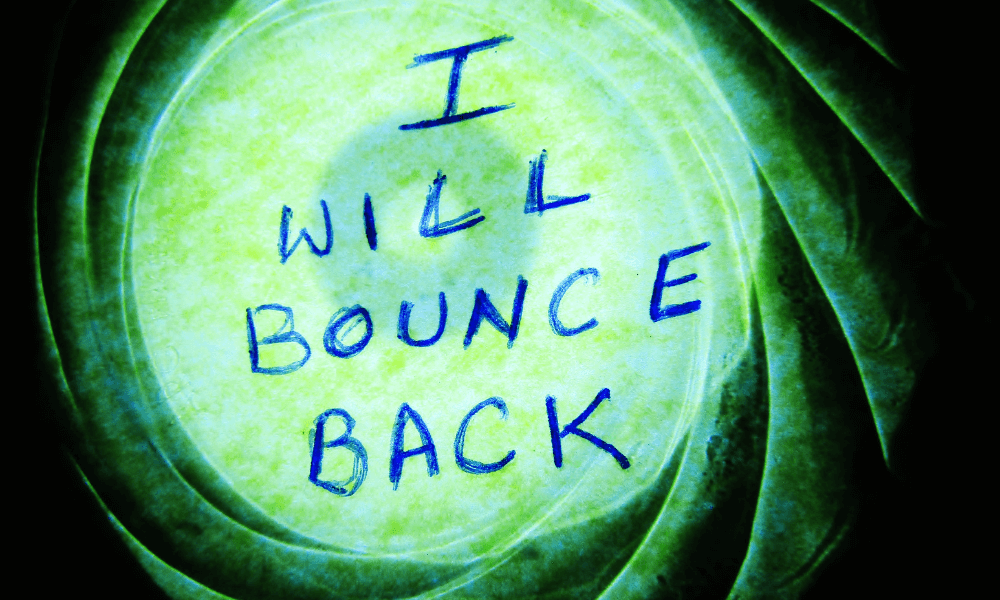
A. Understanding Relapse Triggers
Relapse is a common and often expected part of the recovery process, but understanding its triggers can help individuals anticipate, recognize, and address warning signs before it’s too late. By identifying personal relapse triggers, such as stress, negative emotions, or social pressures, individuals can develop proactive strategies to mitigate risk and maintain sobriety.
B. Developing a Relapse Prevention Plan
Developing a personalized relapse prevention plan empowers individuals to navigate challenging situations and maintain sobriety in the face of temptation. This plan may include strategies for coping with cravings, accessing support systems, practicing self-care, and seeking professional help when needed.
By proactively planning for potential challenges, individuals can minimize the likelihood of relapse and stay on track toward their recovery goals.
C. Seeking Immediate Support
In the event of a relapse, seeking immediate support is crucial for preventing further escalation and recommitting to recovery. Whether it’s reaching out to a trusted friend, contacting a therapist or counselor, or attending a support group meeting, reaching out for help demonstrates strength and resilience in the face of adversity.
With timely intervention and support, individuals can bounce back from relapse and continue their journey toward lasting sobriety. (how to stop drug addiction on your own)
Conclusion
In summary, overcoming drug addiction requires a comprehensive approach that addresses the underlying causes, triggers, and challenges associated with substance abuse.
By recognizing the signs and symptoms of addiction, understanding its root causes, and implementing personalized recovery strategies, individuals can reclaim their lives and embrace a drug-free lifestyle.
Seeking professional guidance, building support networks, and cultivating healthy coping mechanisms are essential components of successful recovery. With determination, perseverance, and support, individuals can overcome addiction and embrace a brighter, healthier future.
I hope you have liked the information we have shared in our article- how to stop drug addiction on your own. To know more about this, you can read other articles too.
Frequently Asked Questions (FAQs)
1. Is it possible to overcome drug addiction without professional help?
- While some individuals may successfully overcome addiction through self-guided methods, seeking professional help significantly increases the likelihood of successful recovery. Professional treatment programs offer comprehensive support, personalized treatment plans, and access to resources that address the complex nature of addiction.
2. How do I help a loved one struggling with addiction?
- Supporting a loved one with addiction can be challenging, but offering empathy, understanding, and encouragement is a crucial first step. Encouraging them to seek professional help, attending support group meetings together, and providing emotional support without enabling addictive behaviors can all be valuable ways to help a loved one in their journey to recovery.
3. What should I do if I relapse during recovery?
- Relapse is a common and often expected part of the recovery process. If you experience a relapse, it’s important to reach out for support immediately. Contacting a therapist, counselor, or support group, reassessing your treatment plan, and implementing coping strategies can help you regain momentum and continue on the path to sobriety.
4. Are there alternative therapies for addiction treatment?
- Yes, there are various alternative therapies that can complement traditional addiction treatment approaches. These may include holistic therapies such as acupuncture, massage therapy, mindfulness meditation, art therapy, or equine-assisted therapy. While not standalone treatments, these modalities can enhance overall well-being and support recovery.
5. How do I rebuild my life after overcoming addiction?
- Rebuilding your life after overcoming addiction involves setting new goals, establishing healthy routines, and cultivating supportive relationships. Engaging in activities that bring you joy, pursuing education or career opportunities, and prioritizing self-care are all essential steps in the process of rebuilding a fulfilling and meaningful life in recovery.
6. What role do support groups play in addiction recovery?
- Support groups, such as Alcoholics Anonymous (AA) or Narcotics Anonymous (NA), provide invaluable peer support, encouragement, and accountability in the recovery journey. By connecting with others who understand the challenges of addiction, individuals can share experiences, gain insights, and find solidarity in their shared commitment to sobriety.
7. How long does addiction treatment typically last?
- The duration of addiction treatment varies depending on individual needs, treatment goals, and the severity of addiction. While some individuals may benefit from short-term interventions, such as detoxification or outpatient therapy, others may require more intensive and long-term treatment, such as residential rehabilitation or ongoing outpatient care. The duration of treatment is often determined on a case-by-case basis, with a focus on achieving sustained recovery and overall well-being.